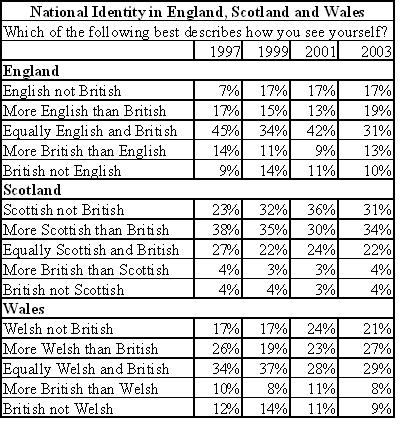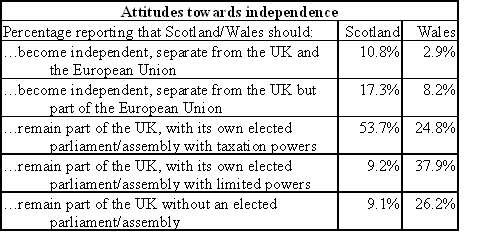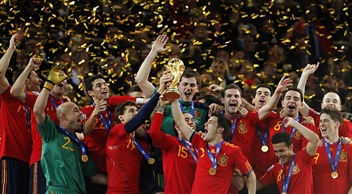Miroirs › 4 classes 4 pays 2011-2012
Projet collaboratif entre classes d’Allemagne, d’Espagne, d’Italie et de Grande-Bretagne.
Deutsche und Europäische Identität
| Reportage erstellt von Sabrina und Sonja im Rahmen des mehrsprachigen Projekts 4 classes - 4pays. |
|---|
Was bedeutet es heutzutage für jeden Einzelnen von uns, Europäer zu sein ?
Auf diese Frage gibt es meist keine eindeutige Antwort.
Manche verbinden mit Europa zuallererst die Europäische Union, kurz EU, die zunächst als wirtschaftlicher Zusammenschluss nach dem 2. Weltkrieg entstand, um mögliche Konflikte untereinander nicht in einem weiteren verheerenden Krieg enden zu lassen. Die EU steht für viele Menschen auch heute noch für Sicherheit und Mobilität.
Kritischere Stimmen bemängeln jedoch die Undurchsichtigkeit der politischen Entscheidungen aus Brüssel, sozusagen die Zentrale der EU.
Durch die Finanz- und Wirtschaftskrisen der letzten Jahre wurde das Vertrauen in die EU zusätzlich erschüttert.
Einige Deutsche sind sich zudem nicht sicher, wie ihre derzeitige Rolle in der EU zu verstehen ist : Sind wir nur Zahlmeister für die Ausfälle in anderen Mitgliedstaaten oder profitieren wir gar von den Problemen der anderen ?
Europäische Identität bedeutet für viele Menschen aber auch noch etwas anderes : Teil eines großen Ganzen zu sein. In Europa gibt es zahlreiche unterschiedliche Kulturen, Sprachen und Mentalitäten, mit denen man quasi zusammentrifft, sobald man das eigene Haus verlässt. Deutschland grenzt beispielsweise an neun andere europäische Staaten, liegt also sozusagen im „Herzen“ Europas.
Aber was genau macht nun die deutsche Identität aus ?
Auch auf diese Frage gibt es keine klare Antwort.
Die Deutschen werden zum einen durch ihre gemeinsame Herkunft, Geschichte und Kultur verbunden. Aber selbst diese können heutzutage stark variieren, da immer mehr Menschen mit deutscher Staatsbürgerschaft ihre Wurzeln in anderen Ländern haben.
Viele Menschen fühlen sich zum anderen ihrer Heimatregion, in der sie aufgewachsen sind, sehr verbunden. So mancher identifiziert sich stark mit dem Teil in Deutschland, aus dem er stammt, z.B. aus Bayern. Dort ist man stolz auf die verschiedenen Dialekte sowie die traditionellen Feste und Gerichte.
Man hört auch oft, dass Menschen aus dem Süden und dem Norden Deutschalnds eine vollkommen andere Mentalität hätten. Süddeutsche seien demnach aufgeschlossener und lebhafter als die kühlen Norddeutschen.
Es gibt also weder eine einheitliche europäische noch eine klar zu definierende deutsche Identität - es kommt auf den Einzelnen an !
Quelle :
http://europa.eu/about-eu/eu-history/index_de.htm
Was verbindet Ihr mit Deutschland ?
Identity in the United Kingdom – Regional, National or European ?
| Report by Helen, Robin and Sonja as part of the project 4 classes 4 pays. |
|---|
(Note - In this article we talk only about Great Britain as the issue of national/regional identity in Northern Ireland is very complex and would require an article of it’s own.)
If you live in Oxford, are you English or British ? And if you live in Newcastle - Geordie (a native of Newcastle upon Tyne), English or British ? And then Glasgow or Cardiff - Scottish/Welsh or British ? Which identity do people associate themselves with the most, regional or national ? Few people in any part of euro-sceptic Great Britain would identify themselves first and foremost as European !
Important aspects of identity
People use a number of things to define an identity including, accents, regional languages, food. Furthermore in different parts of the UK people want different levels of recognition for their identities. In Wales language is of paramount importance, whereas in Scotland political autonomy or even independence is far more important. For Wales and Scotland there is a further complication in that generally they are seen as nations in their own right which are themselves divided into regions.
The Current Situation
In the last general election nationalist parties in Scotland and Wales took 20% and 11% of the vote respectively. Since 1997 powers have been devolved to the regions. Regional assemblies have been created in England as well but are not usually directly elected, London being the major exception. There seems little desire amongst voters in England for these assemblies to exist, let alone gain more powers, although there is support in some major cities for directly elected mayors. So which identity is the most important ? (1)

The stronger nationalist feeling in Scotland is reflected in a stronger desire for independence or at least more regional autonomy (2)

Conclusion
Unsurprisingly, given that the terms England/English and Britain/British are often used interchangeably, the sense of a separate English identity is weaker than is the case for Welsh and Scottish identities. The misuse of the word English to describe something that is British could itself fuel a feeling in Scotland and Wales that they are seen as little more than appendages of England. Anecdotally it seems that many recent immigrants in England feel themselves to be British rather than English, whereas in Scotland and Wales they feel more comfortable with a Scottish or Welsh identity. Thus it seems that the “English” identity is becoming a label of ethnicity rather than culture. (3)
Now some questions for you
Create your free online surveys with SurveyMonkey, the world’s leading questionnaire tool.
And finally how do you define the identity that is most important to you, is it language, culture, sense of humour, geographical location or something else ? Please leave a comment telling us what you think.
Sources
(1) Table is taken from a report written for the UK Economic and Social Research Council written in 2006 ( http://www.devolution.ac.uk/Final%20Conf/Devolution%20public%20attitudes.pdf )
(2) Table taken from a paper written in 2001 for the Centre for Research into Elections and Social Trends (National Identity and Independence Attitudes : Minority Nationalism in Scotland and Wales By Robert Andersen http://www.crest.ox.ac.uk/papers/p86.pdf )
(3) See briefing paper issued by the UK Economic and Social Research Council written in 2005 “Towards a multicultural nationalism ? Anglophobia and Islamophobia in Scotland – Briefing No 24” http://www.devolution.ac.uk/pdfdata/Briefing%2024%20-%20Hussain-Miller.pdf
What do you think about this ?
Deutsche und Europäische Identität
| Reportage erstellt von Sabrina und Sonja im Rahmen des mehrsprachigen Projekts 4 classes - 4pays. |
|---|
Was bedeutet es heutzutage für jeden Einzelnen von uns, Europäer zu sein ?
Auf diese Frage gibt es meist keine eindeutige Antwort.
Manche verbinden mit Europa zuallererst die Europäische Union, kurz EU, die zunächst als wirtschaftlicher Zusammenschluss nach dem 2. Weltkrieg entstand, um mögliche Konflikte untereinander nicht in einem weiteren verheerenden Krieg enden zu lassen. Die EU steht für viele Menschen auch heute noch für Sicherheit und Mobilität.
Kritischere Stimmen bemängeln jedoch die Undurchsichtigkeit der politischen Entscheidungen aus Brüssel, sozusagen die Zentrale der EU.
Durch die Finanz- und Wirtschaftskrisen der letzten Jahre wurde das Vertrauen in die EU zusätzlich erschüttert.
Einige Deutsche sind sich zudem nicht sicher, wie ihre derzeitige Rolle in der EU zu verstehen ist : Sind wir nur Zahlmeister für die Ausfälle in anderen Mitgliedstaaten oder profitieren wir gar von den Problemen der anderen ?
Europäische Identität bedeutet für viele Menschen aber auch noch etwas anderes : Teil eines großen Ganzen zu sein. In Europa gibt es zahlreiche unterschiedliche Kulturen, Sprachen und Mentalitäten, mit denen man quasi zusammentrifft, sobald man das eigene Haus verlässt. Deutschland grenzt beispielsweise an neun andere europäische Staaten, liegt also sozusagen im „Herzen“ Europas.
Aber was genau macht nun die deutsche Identität aus ?
Auch auf diese Frage gibt es keine klare Antwort.
Die Deutschen werden zum einen durch ihre gemeinsame Herkunft, Geschichte und Kultur verbunden. Aber selbst diese können heutzutage stark variieren, da immer mehr Menschen mit deutscher Staatsbürgerschaft ihre Wurzeln in anderen Ländern haben.
Viele Menschen fühlen sich zum anderen ihrer Heimatregion, in der sie aufgewachsen sind, sehr verbunden. So mancher identifiziert sich stark mit dem Teil in Deutschland, aus dem er stammt, z.B. aus Bayern. Dort ist man stolz auf die verschiedenen Dialekte sowie die traditionellen Feste und Gerichte.
Man hört auch oft, dass Menschen aus dem Süden und dem Norden Deutschalnds eine vollkommen andere Mentalität hätten. Süddeutsche seien demnach aufgeschlossener und lebhafter als die kühlen Norddeutschen.
Es gibt also weder eine einheitliche europäische noch eine klar zu definierende deutsche Identität - es kommt auf den Einzelnen an !
Quelle :
http://europa.eu/about-eu/eu-history/index_de.htm
Was verbindet Ihr mit Deutschland ?
España : "Una, grande y libre" o crisol de diferentes culturas
| Reportaje realizado por Jorge en el marco del proyecto 4 classes, 4 pays. |
|---|
¿Nos identificamos actualmente todos los españoles con la idea de identidad nacional que se tiene tanto en el interior como en el exterior de España ?
En España, como en otros países europeos, existe una cierta tensión entre diferentes tendencias nacionalistas antagonistas, entre un nacionalismo español centralista y nacionalismos de carácter independentista como el catalán y el vasco.
La identidad nacional española actual
Los resultados de un estudio europeo confirman la dificultad que sienten la mayoría de los españoles para identificarse con los símbolos oficiales, como la bandera o el himno, y el rechazo al nacionalismo español, por su relación con el pasado autoritario.
No obstante, dicho estudio también pone de relieve que los conflictos sobre la identidad nacional en el ámbito político nacionalista no se dan en la misma medida entre los ciudadanos, pues la gran mayoría de los catalanes y vascos entrevistados se sienten a la vez catalanes/vascos y españoles sin conflicto aparente.
En los últimos años el deporte español ha alcanzado un éxito sin precedentes en distintos deportes como el fútbol, el baloncesto, el tenis o el mundo del motor, lo cual ha contribuido a proyectar una buena imagen de España en el exterior, a que la mayoría de los españoles se sientan orgullosos por los éxitos alcanzados por nuestro país en este terreno, y a que disminuya el rechazo a los símbolos oficiales como la bandera o el himno.

La gastronomía española también ha logrado un liderazgo mundial de la mano de chefs de reconocido prestigio, y, tanto en el deporte como en la gastronomía, la contribución de catalanes y vascos ha sido decisiva para lograr estos éxitos.
Actualmente los principales elementos que conforman la identidad española son el idioma, el territorio, el « carácter » y las costumbres, percibidas éstas de un modo un tanto estereotipado.
Conclusión
La identidad nacional debería ser siempre una mezcla equilibrada de las identidades múltiples regionales, que permita sentirse identificados a todos sus ciudadanos, pues cuando la identidad nacional se construye contra los particularismos culturales y lingüísticos de las regiones, ello suele provocar el rechazo de las regiones que no se sienten bien identificadas en el seno de la identidad nacional dominante.
Fuentes :
Proyecto de investigación europeo EURONAT, financiado por la Comisión Europea (V Programa Marco) y el Vicerrectorado de Investigación de la UNED :
1) “La identidad nacional y europea de los ciudadanos españoles, estudio cualitativo de entrevistas y grupos de discusión” :
http://www.cepc.es/es/Publicaciones/revistas/revistas.aspx?IDR=3&IDN=614&IDA=26378
2) Ciudadanos de España : Europeos orgullosos, españoles sin complejos :
http://www.eui.eu/RSCAS/Research/EURONAT/200502PM.EURONAT-E.pdf
La patria es una camiseta :
http://www.elpais.com/articulo/sociedad/patria/camiseta/elpdepfutmunart/20100709elpepisoc_1/Tes
Lenguas por número de hablantes nativos :
http://es.wikipedia.org/wiki/Anexo:Lenguas_por_número_de_hablantes_nativos
¿Y tu, te identificas plenamente con la idea de identidad española que se está dando actualmente dentro y fuera de España, o cambiarías algo para que reflejara mejor la diversidad cultural de las regiones que la integran ?
Identità nazionale e identità regionale
| Reportage realizzato daglinell’ambito del progetto 4 classes, 4 pays. Luca |
|---|
L’Italia è una nazione giovane, unita sotto un’unica bandiera soltanto dal 1861. Ma l’Italia esisteva anche quando non era politicamente unita, come regione storica e come identità culturale : già Dante parlava di una “serva Italia”, quando la penisola era divisa in comuni autonomi come piccoli stati.
Un po’ di storia
Già nel Cinquecento gli italiani discutevano su una lingua letteraria in un bello stile italiano, anche se poi tutta la penisola era divisa in regni e ducati, molti dei quali dominati da regnanti stranieri. Tutto questo ha fatto dell’Italia uno stato unito da un punto di vista geografico, ma culturalmente molto frammentato, perché le varie regioni si sono contaminate con la cultura dei vari dominatori, che siano stati i francesi e gli spagnoli nell’Italia settentrionale, o gli arabi e gli svevi nel sud Italia. Tutto questo ha dato agli italiani un’identità regionale molto accentuata, fatta di abitudini e di dialetti.
Oggi e ieri
Ma soprattutto, la fortissima emigrazione avvenuta a partire dal dopoguerra dal sud verso il nord Italia ha accentuato, nei migranti, il sentimento di attaccamento e di nostalgia per il proprio paese natale, pur continuando a vivere dentro i confini nazionali. Per converso, poi, la mancata integrazione fra queste diverse anime dello stesso paese ha dato vita a movimenti e partiti politici con una forte connotazione regionale, ostili nei confronti dei non autoctoni, che spingono per ottenere una maggiore autonomia delle realtà locali dalla capitale. Da quasi vent’anni, per esempio, è questo il programma della Lega Nord, un partito politico nato in Lombardia, che punta all’autonomia amministrativa delle regioni. Le posizioni estremiste di un partito come La Lega Nord nascono da una politica concentrata su Roma, senza che le regioni abbiano se non scarsa autonomia decisionale.
Uno stato centralizzato
Ma questa idea di stato centralizzato, in origine, serviva a dare un segnale forte di unità in uno stato appena nato, che doveva riconoscersi in un unico centro. Al tempo stesso, però, il contrasto fra il nord del paese, più ricco e sviluppato, e il sud, ancora agricolo e impoverito, aveva dato vita, dall’inizio del Novecento, alla cosiddetta “questione meridionale”, con una forte presenza assistenziale dello stato nei confronti delle regioni più povere e meno sviluppate. I partiti che puntano alla secessione, o almeno al federalismo fiscale, partono proprio da questo problema, accusando lo stato di mantenere una situazione si sottosviluppo a spese delle regioni più ricche e produttive.
Le due anime degli italiani, quella nazionale e quella locale, continuano a scontrarsi. Ma del resto, una vera unità culturale è avvenuta soltanto negli ultimi cinquant’anni, quando gli italiani, grazie alla televisione, hanno cominciato a parlare tutti, per la prima volta, la stessa lingua.
Fonti :
Enciclopedia multimediale delle scienze filosofiche
Ti senti Italiano, Siciliano, Lombardo, Calabrese, Toscano, Romagnolo o cittadino europeo ?
